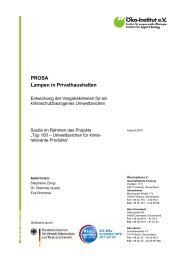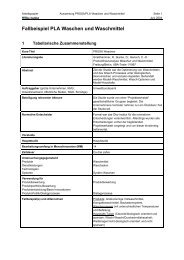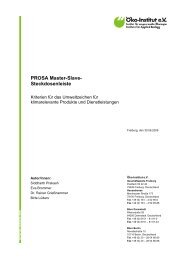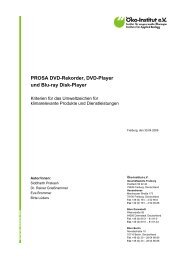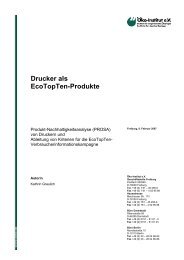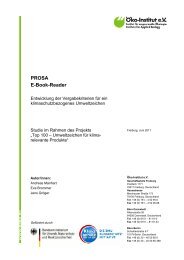PROSA – Product Sustainability Assessment - PROSA - Produkt ...
PROSA – Product Sustainability Assessment - PROSA - Produkt ...
PROSA – Product Sustainability Assessment - PROSA - Produkt ...
Sie wollen auch ein ePaper? Erhöhen Sie die Reichweite Ihrer Titel.
YUMPU macht aus Druck-PDFs automatisch weboptimierte ePaper, die Google liebt.
<strong>PROSA</strong> <strong>Product</strong> <strong>Sustainability</strong> <strong>Assessment</strong><br />
Bei <strong>PROSA</strong> musste zu Beginn des Vorhabens daher eine allgemeine nicht<br />
unternehmensspezifische Methode zur produktbezogenen Sozialbilanz (englisch: Social Life<br />
Cycle <strong>Assessment</strong>; SLCA) neu entwickelt werden. Vorteilhafterweise wurde parallel bei der<br />
UNEP-SETAC die Taskforce „Integration of Social Aspects into LCA“ gebildet. Das Öko-<br />
Institut kooperierte mit der Taskforce, stellte seinen Methodenentwurf vor und leitete eine<br />
zweijährige Feasibility-Studie zur Beschreibung und methodischen Harmonisierung der<br />
Sozialbilanz (Grießhammer et al 2006).<br />
Nachfolgend wird die Feasibility-Studie wörtlich wiedergeben (Grießhammer et al. 2006). Die<br />
Originalsprache Englisch wird dabei beibehalten, weil der Text gemeinsam mit externen<br />
Autoren erstellt wurde und es keine autorisierte Übersetzung gibt. Es wird ausdrücklich<br />
darauf hingewiesen, dass der nachfolgende Text in den Kap. 10.2 <strong>–</strong> 10.9 ein<br />
Gemeinschaftswerk der Taskforce „Integration of Social Aspects into LCA“ und folgender<br />
AuorInnen ist: Rainer Grießhammer, Catherine Benoît, Louise Camilla Dreyer, Anna Flysjö,<br />
Andreas Manhart, Bernard Mazijn, Andrée-Lise Méthot und Bo Weidema.<br />
10.2 Feasibility Study: Integration of social aspects into LCA<br />
Abstract: The feasibility study was prepared in a multi-stage discussion process within the<br />
context of the Task Force "Integration of social aspects into LCA" of the UNEP-SETAC Life<br />
Cycle Initiative. The methodology of environmental or biophysical LCA was taken and<br />
checked, whether and how social aspects can be integrated or supplemented to conduct a<br />
Social LCA (SCLA). Furthermore core elements and requirements upon the integration of<br />
social aspects are formulated.<br />
In terms of methodology, there are evidently no fundamental problems calling the feasibility<br />
of SLCA into question. There are however certainly considerable hurdles to be overcome in<br />
practice, especially in characterisation modelling, because social impacts will require an<br />
entirely different type of modelling. Hurdles arise in the goal and scope definition (for<br />
example system boundaries and allocation/cut off criteria), in the categorization of indicator<br />
groups, in the classification of the associated individual indicators and in their<br />
characterization. It is quite probable that the very different appraisals of social aspects by<br />
different actors and in different countries, in combination with the process of interdisciplinary<br />
scientific discourse, will delay agreement for a longer time.<br />
To promote the development and practical use of Social LCA the next important steps are to<br />
conduct more case studies, to establish a generally accepted list of well defined social<br />
indicators, to establish databases and to collect modules for the upstream chains and to<br />
compose an (extended) "code of practice" for Social LCA.<br />
146



